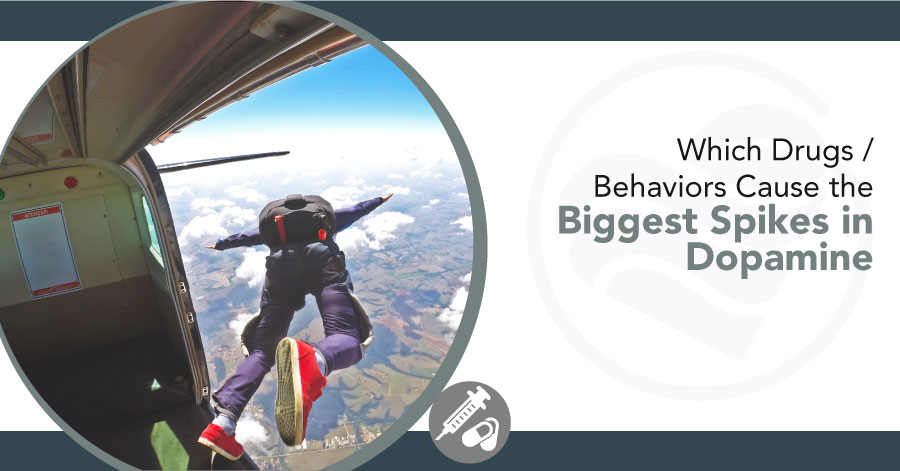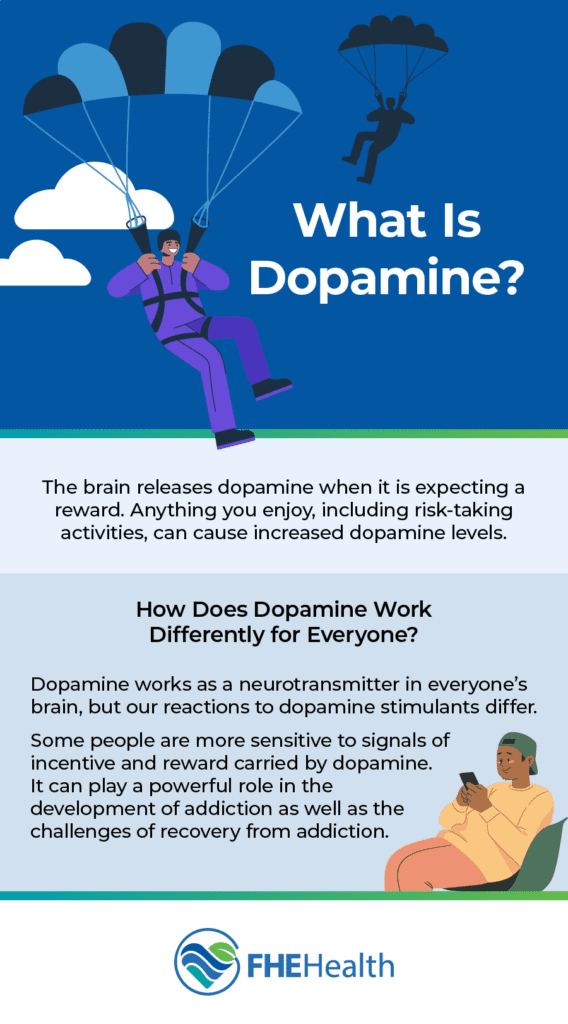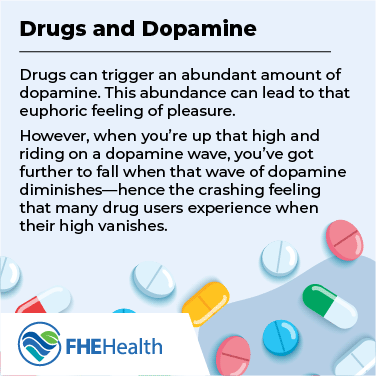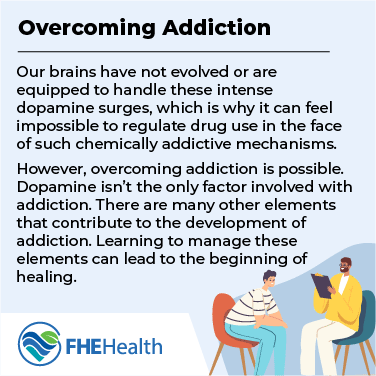
Some people feel exhilarated by driving fast, hang gliding, or bungee jumping, but it seems that what they really enjoy is the dopamine rush that these types of activities can trigger. Of course, simply eating a square of chocolate or kissing your partner can produce sensations caused by a flooding of feel-good chemicals in the brain. And who doesn’t like feeling good?
Unfortunately, the trouble with feeling good is that it can be followed by a comedown side effect. Feel-good chemicals in the brain like dopamine taper off, leaving individuals feeling a bit depleted after having just felt on top of the world.
In many ways, the psychological comedown associated with these potentially dangerous activities mimics what happens when people use drugs recreationally. Many of these drugs target the brain’s reward centers and cause a surge in feel-good chemicals like dopamine. The high that this reaction produces is not unlike the powerful buzz of excitement that a person can feel when they’re parachuting out of an airplane or scaling up the side of a mountain.
While people’s responses to dopamine—its surges and letdowns—can differ, the near-universal desire to experience heightened pleasure can inform an understanding of addiction. Most addictive substances will cause a dopamine spike. Understanding the chemical mechanism that drives people to abuse drugs can explain why overcoming substance addiction–or other forms of addiction–can be so difficult.
What Is Dopamine?
 Known as the “feel-good” hormone, dopamine is a chemical messenger that relays signals between brain cells. This definition doesn’t readily explain the intense feelings of pleasure that the chemical can trigger and, yet, dopamine is much more complex than at first glance. The brain releases dopamine when it is expecting a reward. Anything you enjoy, including those risk-taking activities, can cause increased dopamine levels.
Known as the “feel-good” hormone, dopamine is a chemical messenger that relays signals between brain cells. This definition doesn’t readily explain the intense feelings of pleasure that the chemical can trigger and, yet, dopamine is much more complex than at first glance. The brain releases dopamine when it is expecting a reward. Anything you enjoy, including those risk-taking activities, can cause increased dopamine levels.
We can see dopamine at work all around us. Visit a playground. The first thing that a child wants to do while laughing their way down the slide is to get up and do it again. Once we understand on a chemical level that an activity will give us pleasure, we want to repeat the behavior. Once you learn that chocolate cake triggers your reward center, you want to eat it again. We learn both consciously and chemically what feels good and will, depending on circumstances, be willing to repeat those feel-good actions or activities.
How Does Dopamine Work Differently for Everyone?
Dopamine works as a neurotransmitter in everyone’s brain, but our reactions to dopamine stimulants differ. We know this because many of us have a friend who refuses to ride roller coasters. The idea of bungee jumping fills some people with dread–not pleasure. And, believe it or not, there are those who, even after having chocolate cake, find it quite easy to say no to a slice without a twinge of displeasure.
Dopamine Signals
Studies out of universities like Cornell have demonstrated that some people are more sensitive to signals of incentive and reward carried by dopamine. This could be a biochemical marker underlining what some people have called an “addictive personality.” Of course, there are many factors that can drive addiction, and dopamine isn’t the only one. However, it can play a powerful role in the development of addiction as well as the challenges of recovery from addiction.
 Lots of things can stimulate dopamine like sex, exercise, the nicotine in cigarettes, and recreational drugs like heroine or cocaine. While sex promotes the natural release of dopamine, drugs can trigger an abundant amount of dopamine. This abundance can lead to that euphoric feeling of pleasure. However, when you’re up that high and riding on a dopamine wave, you’ve got further to fall when that wave of dopamine diminishes—hence the crashing feeling that many
Lots of things can stimulate dopamine like sex, exercise, the nicotine in cigarettes, and recreational drugs like heroine or cocaine. While sex promotes the natural release of dopamine, drugs can trigger an abundant amount of dopamine. This abundance can lead to that euphoric feeling of pleasure. However, when you’re up that high and riding on a dopamine wave, you’ve got further to fall when that wave of dopamine diminishes—hence the crashing feeling that many  Our brains have not evolved or are equipped to handle these intense dopamine surges, which is why it can feel impossible to regulate drug use in the face of such chemically addictive mechanisms. When medical experts talk about how addiction changes the chemistry of the brain, they’re referring to the chemical changes that involve dopamine and the brain’s need to replenish those skyrocketing levels that drugs achieve.
Our brains have not evolved or are equipped to handle these intense dopamine surges, which is why it can feel impossible to regulate drug use in the face of such chemically addictive mechanisms. When medical experts talk about how addiction changes the chemistry of the brain, they’re referring to the chemical changes that involve dopamine and the brain’s need to replenish those skyrocketing levels that drugs achieve.





